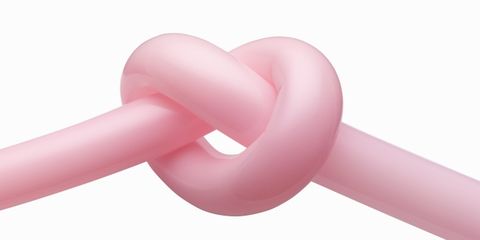What Do You Take When You Re Constipated

Sally Williams Photography/Getty Images
Some 1 in 4 Americans suffer a little backup in the old plumbing now and again, according to data from the National Institutes of Health. "Every day I see patients complaining of constipation," says Connecticut-based gastroenterologist Ed Levine, MD. More often than not, your toilet trouble comes from lifestyle habits such as a low fiber diet, not drinking enough water (up your water consumption with these slimming sassy water recipes), lack of exercise, and repeatedly blowing off the urge to go. But occasionally there's a more surprising cause of constipation, which is defined as fewer than three bowel movements a week or ones that are hard, dry, small and painful, or difficult to pass. Check out the more unexpected reasons why the going may be slow.
1. Hypothyroidism
Your thyroid is responsible for controlling metabolism, so when it's less active, so is your plumbing. "The muscles in the intestinal tract slow down, causing the stool to travel through the colon at a slower pace," Levine explains. "The longer a stool hangs out in the colon, the more water gets drained from it, making it harder and tougher to pass." Hypothyroidism gets more common as we age, affecting some three million Americans, according to the Mayo Clinic. Fortunately, there's a simple, accurate blood test to diagnose the condition and safe medications to treat it.(Balance your hormones—and lose up to 15 pounds in just 3 weeks—with The Hormone Reset Diet. )
2. Depression

Chinaface/Getty Images
While your body's systems can slow down with depression symptoms, you're also likely to be following a different lifestyle. "People with depression aren't as active—you might be lying in bed all day," says psychiatrist Wendy Levine, MD, of St. Vincent's Medical Center in Bridgeport, CT. "You may be eating more carbs or eating more—or less—in general; a change from your regular, balanced diet." Moving less and eating more, especially comfort foods that are low in fiber, can spell gut trouble. Many people are slow to seek help for their depression, but if you or a loved one is persistently down, don't hesitate: Medications, psychotherapy and other treatments have been proven to help.
MORE: 9 Surprising Signs Of Depression
3. Medications
Popping certain types of pills can potentially cause constipation. Topping the list is painkillers, particularly opioids and narcotics. These drugs cause a body-wide slow down—including your colon. Other meds that can stop you up, according to the American Gastroenterological Foundation, include some antidepressants, antacids that contain aluminum or calcium, antispasmodic and anticonvulsant drugs (for epilepsy), tranquilizers, anti-Parkinson's drugs, and calcium channel blockers for high blood pressure and heart conditions.
"A lot of these medications have an anti-cholergenic effect," Levine explains: Anti-cholergenics are drugs that interfere with parasympathetic nerve impulses, which direct the behind-the-scenes work of the GI tract, lungs, urinary tract, and other parts of the body. You could be prescribed anti-cholergenic drugs for asthma, allergies, incontinence, GI cramps, and muscle spasms. If you suspect your prescription is slowing your GI tract down, talk to your doctor about alternative meds or laxatives.
4. Supplements
Calcium and iron in particular have been known to trigger constipation. "Iron and calcium are binding—they make everything stick together," Levine says. If you've been prescribed iron supplements to treat a deficiency, don't cut back to avoid constipation. Instead, add more fiber to your diet or take a gentle laxative. (Here are 8 more constipation solutions for when fiber's not getting the job done.)
5. Pregnancy

Hero/Getty Images
Blame your hormones. "During pregnancy, the hormone progesterone relaxes the smooth muscles in the bowel, so it moves more slowly," Levine explains. The bowel also bears the weight of your growing uterus. "The uterus sits on the bowel, squishing it, so your stool is moving through a thinner pipe—it's going to travel more slowly," Levine adds.
6. Laxative overuse
There's little harm in taking a laxative once in a while, but daily use can lead to stoppage. Especially troublesome are the type that work by stimulating the nerves of the colon, such as Dulcolax, Ex-Lax, and Senna. "Over time, your muscles are not being used, so they can weaken," explains Levine, and then they start to depend on the laxative effect. A safer bet, he suggests, is a bulk-forming laxative such as psyllium that doesn't change the body's natural actions but simply bulks up the stool with water and stimulates the intestines for easier passage. (Look for brands such as GenFiber and Metamucil.)
MORE: 8 Things That Happen When You Stop Drinking Diet Soda
7. Irritable Bowel Syndrome (IBS)
You could have a chronic condition such as IBS, a disorder of the large intestine that may affect as many as 20% of adults, according to the National Digestive Diseases Information Clearinghouse. With IBS, spasms of the colon can delay movement through the digestive tract, leading to constipation—which can alternate with diarrhea—as well as abdominal pain and cramping. Mild cases of IBS can usually be managed with dietary and lifestyle changes. For moderate to severe cases, there are prescription medications.
8. Chocolate
Dark chocolate often wears a health halo because of its high antioxidant content, but the indulgence may also stop you up, especially if you have IBS. According to researchers writing in the European Journal of Gastroenterology and Hepatology, people with IBS often have trigger foods, including chocolate, which can cause symptoms, namely abdominal discomfort and constipation. If you suspect a connection between eating chocolate and constipation, try cutting the treat out of your diet to see if symptoms improve.
This content is created and maintained by a third party, and imported onto this page to help users provide their email addresses. You may be able to find more information about this and similar content at piano.io
What Do You Take When You Re Constipated
Source: https://www.prevention.com/health/a20465506/causes-of-constipation/
0 Response to "What Do You Take When You Re Constipated"
Post a Comment